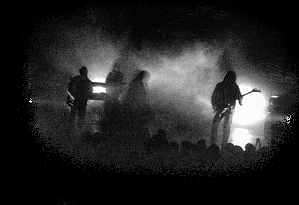Biography
Many bands have produced "concept albums" and that is impressive.
A concept album is more than just a group of songs, and it requires an artistic
vision -- a precious quality that is far too rare these days. Artaud Franzmann
(picture left), demonstrating a vision of extraordinary breadth and depth
took this notion one step further with The Garden of Delight, a "concept
band," if you will. Founded in 1991, Artaud proclaimed that G.O.D.
would produce seven albums in seven years with seven songs each -- seven
is a very powerful number and, in some arcane traditions, seven thrice is
the number of perfection. The corpus of The Garden of Delight cannot be
viewed as individual albums or songs -- they are all integral aspects of
the whole plan that Artaud has been consistently explicating since the first
years of this decade. In the 1994 song "Necromanteion (S.O.C.R.),"
Artaud utters "The Last of the Lost Ones/Tell them I want to see them."
On their most recent album "Scheoul," he declares "We are
the Last of the Lost Ones." Six years and six albums later, the circle
approaches completion. . .
Musically, there can be little doubt that Artaud is influenced by Carl McCoy in both subject matter and vocal style (actually, he seems to be the one man on the face of the earth with a voice that is actually deeper ..than Carl's), and by and large, G.O.D. retain the fundamental structure of "a man and his drum machine." However, Artaud sneers at the notion that the Garden of Delight is a "goth" band. Considering goth, one immediately thinks of bands that are influenced by the Sisters of Mercy. Granted, there is a certain degree of such within the Garden of Delight's work (particularly Symbol and Vision). However, this does not take into account the incredible diversity of their music. Indeed, while all of their albums have had thematic consistency, their music has changed greatly through the years. The Garden of Delight never seem content with a particular "sound." They will adopt one, master it, synthesize it with something else, and then move on. To firmly label the Garden of Delight would imply musical stagnation, which is quite far from the truth.
And what then, of the this "plan," of the much-heralded subject matter? Well, my friends, Artaud is never so blatant as to directly state all of its aspects, therefore I shall not either. This is completely independent of the fact that I have not entirely worked it out either.
--Stephen Walsh, 5/20/97
Since the release of their first album, "Epitaph", the Garden has been on the mysterious record label, Dion Fortune, home to other such acts as the Merry Thoughts (who have recently left the label) and Diary of Dreams. For every album, there has been a consistent numerology pertaining to the number seven, seven songs for well...six albums (another one, please?). Sadly, their newest album, "Scheoul" is apparently the last album Garden of Delight will ever release. There is also the theme of the Lost Ones throughout the albums as well, and perhaps the whole slew of them is an overall 'concept'...however, this author doesn't know.
Over the years, there have been many changes in their line-up, but the Garden has always kept to the core "Sisters of Mercy duo" - the man and his drum machine. In this case, the drum machine is The Watchtower (finally named in the credits for Scheoul). In style, however, they certainly aren't a Sisters clone. Certainly, the Garden pays much homage to their predecessor, the Fields of the Nephilim, with their Lovecraftian imagery, and their love of all that is Pagan. However, the Garden has covered many other styles of music, ranging from dancy guitar-rock, to dark synth music, to mellow atomspheres under just Artaud and a 'piano'. Practically, with every album, the Garden had a stylistic change, which never really created a detriment to their music. Definitely, they gave gothic music yet another sound other than the bevy of early eighties copycat artists who already exist.
They will be missed.

-Vlad (4/2/97)